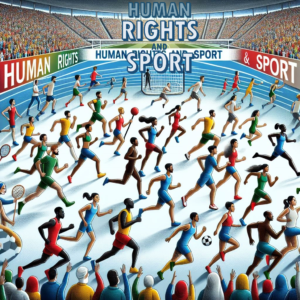HUMAN RIGHTS AND SPORT

The Olympic Charter
The Olympic Charter, in Principle 4 of the Fundamental Principles of Olympism, makes it quite clear that the practice of sport is a human right, and provides that:
“Every individual should have the right to practice sport without discrimination and in the spirit of the Olympics. This spirit includes mutual understanding, friendship, solidarity, and fair play.”
Principle 6 provides that:
“The enjoyment of the rights and freedoms set forth in this Olympic Charter shall be secured without discrimination of any kind, such as race, colour, sex, sexual orientation, language, religion, political or other opinion, national or social origin, property, birth or other status.”
Rule 2.18 of the Charter provides that:
“The IOC’s role is to promote safe sport and the protection of athletes from all forms of harassment and abuse.”
Other International Sports Federations have included similar provisions in their Statutes/Constitutions/Bidding Documents.
UEFA EURO 2024 Bidding Agreement
For example, section 3 of the UEFA EURO 2024 Agreement contains the following obligation regarding Human Rights:
“The bidders have the obligation to respect, protect and fulfil human rights and fundamental freedoms, with a duty to respect human, labour and child rights during the Bidding Procedure and, if appointed, until the end of the dismantling of UEFA EURO 2024.”
And the section further provides as follows:
“ ‘Human rights’ refers to the set of rights and freedom to which all human beings are considered to be entitled to, whatever their nationality, place of residence, sex, sexual orientation, national or ethnic origin, colour, religion, language, age or any other status. These rights are all interrelated, independent and indivisible.”
As will be seen, this is an important and fundamental condition for bidding for and, if successful, organising the UEFA EURO 2024 event.
The Council of Europe
Article 6 of the Council of Europe Revised European Sports Charter of 28 November 2023 provides as follows:
“Stakeholders shall respect and protect internationally recognised human rights and fundamental freedoms and they should observe the general framework established for their implementation in business and other activities.”
Another important provision.
The European Convention on Human Rights
Article 6.1
Of the Articles of the European Convention on Human Rights in relation to sport, perhaps the one most invoked by sportspersons is Article 6.1, which may be described as the article that guarantees due process in court and arbitration proceedings. In other words, guarantees the right to a fair trial.
Article 6.1 provides as follows:
“In the determination of his civil rights and obligations or of any criminal charge against him, everyone is entitled to a fair and public hearing within a reasonable time by an independent and impartial tribunal established by law.”
In this connection, our Founder and Managing Partner, Dr Lucien Valloni, successfully represented a British-Turkey international footballer before the European Court of Human Rights for breach of this Article by the Turkish Football Federation.
Other Articles
Of course, according to the particular circumstances, sportspersons may bring claims for breaches of other Articles of the Convention.
For example, breaches of Article 8 of the Convention, which guarantees the right to respect for family life, as claimed in the case of von Hannover v. Germany (no.2). This case involved the publication, without her consent, in German Magazines of two series of photographs of Princess Caroline von Hannover relating to her private life. In its Judgement of 7 February 2012, the Grand Chamber of the Court, upheld her claim to breach of Article 8, holding that:
“The right to the protection of one’s image …. mainly presupposes the individual’s right to control the use of that image, including the right to refuse publication thereof ….” (para. 96).
On the related question of freedom of expression, another human right guaranteed under Article 10 of the Convention, the Grand Chamber added:
“[Freedom] of expression includes the publication of photos …. This is nonetheless an area in which the protection of the rights and reputation of others takes on particular importance, as the photos may contain very personal or even intimate information about an individual or his or her family ….” (para. 103).
Often the object of the paparazzi, who frequently overstep the mark to get their photos, well-known sports personalities, may also find themselves in similar sensitive situations and may also wish to invoke Article 8 of the Convention to protect their valuable image rights. The well-known former British and England footballer, David Beckham, has also found himself in such a situation.
As a further example of other breaches of the Convention, mention may also be made of the Caster Semenya case, in which she successfully brought a claim under Articles 8, 13 and 14 of the Convention. The Court found that there were inadequate institutional and procedural safeguards to prevent discrimination against her and that her right to an effective remedy had also been violated.
The CAS Overview on Human Rights and Sport
A useful Overview of the subject of Human Rights and Sport has been published, on 28 November 2023, by the Court of Arbitration for Sport (CAS) and treats the subject from a CAS point of view.
This CAS Overview covers the following topics:
- Human rights in sport regulations.
- Selected CAS cases related to Human Rights issues.
- SFT (Swiss Federal Supreme Court) judgements dealing with the application of Human Rights in CAS matters.
- Sport and the European Convention on Human Rights.
- List of CAS Arbitrators with specific expertise in Human Rights.
- List of topics related to Human Rights in Sport discussed at past CAS Seminars.
The text of the CAS Overview may be accessed by logging onto the CAS official website at: ‘www.tas-cas.org’.
Further information, advice and legal representation in Human Rights Sports Cases
Please email Dr Lucien Valloni at ‘valloni@valloni.ch’.